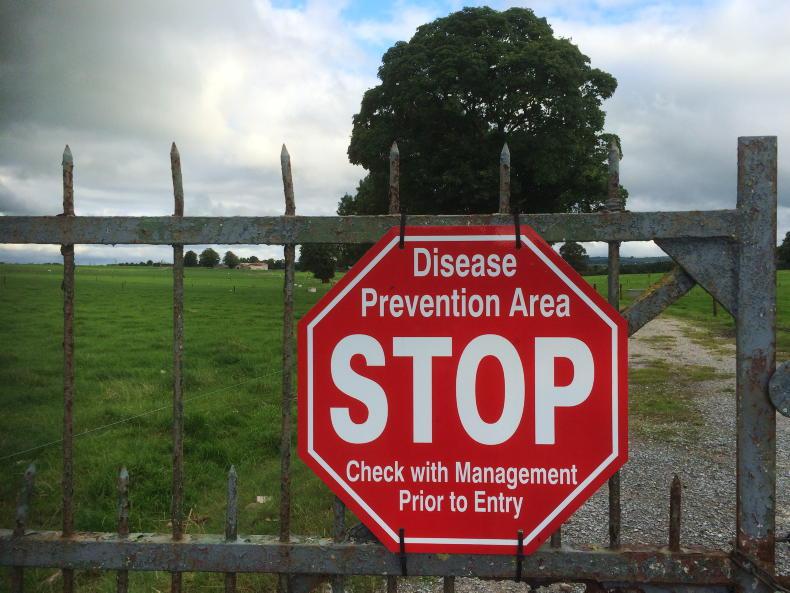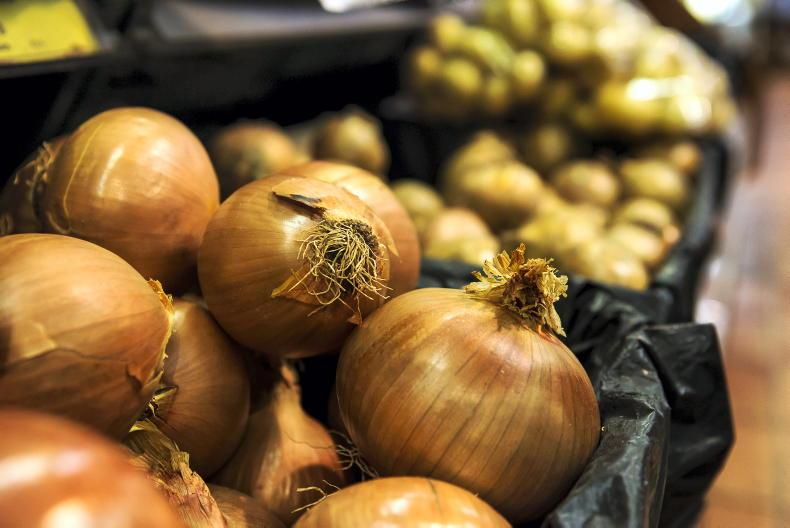The poultry industry is faced with a significant disease threat of avian influenza (AI) and this year is no different.
On 3 November 2021, the first case of Highly Pathogenic AI (HPAI) was confirmed in a wild bird in Galway.
Since this announcement, the situation has only worsened. There are now over 50 confirmed cases in wild birds and six cases in commercial poultry holdings in Cavan, Monaghan, Tyrone and Antrim.
The Department of Agriculture, Food and the Marine (DAFM) has introduced a nationwide housing order from November 22.
This means all flock owners are legally required to keep all flocks indoors until the order is lifted. In an effort to limit the spread of HPAI, all producers must tighten the biosecurity measures being implemented on-farm.
DAFM has introduced a Statutory Instrument (S.I. No. 593 of 2021) in relation to biosecurity measures which must be in place on all farms.
Biosecurity measures
It is crucial to limit the number of visitors to the poultry site. Only essential visitors should be granted access to the site.
Those who must come on site should be fully clothed in Personal Protection Equipment (PPE). This should include disposable boot covers, cover-alls, gloves, hair net and face mask.
A detailed visitor log must be kept of all visitors
This PPE must be left on site, to prevent spread elsewhere.
A detailed visitor log must be kept of all visitors; this should include feed deliveries, gas deliveries, date, name, vehicle registration, company, reason for visit, the last poultry site visited and the date of that visit.
Staff/personnel working on-farm must be fully aware of all biosecurity measures. They must not be in contact with any other poultry of any type. If this is unavoidable, they must take all reasonable measures to prevent the transfer of AI to or from a poultry unit.
These measures should include the cleaning and disinfection of equipment, vehicles and footwear that may have been in contact with poultry or captive birds.
Disinfection of vehicles should take place at the gate
Staff should be provided with house-specific clothing and footwear. Outdoor shoes should not enter the commercial poultry house.
Disinfection of vehicles should take place at the gate, using a suitable method of disinfecting – a suitable disinfectant should be available at all times for essential visitors who come on site. There must be footdips at all entry and exit points to the unit. The disinfectant must be effective against AI (see DAFM’s approved list). This must be replenished as required.
Hand washing facilities should be readily available in the store area, with antibacterial soap and hot water present.
Within the store area, a step-over barrier creates distinct dirty and clean zones. This barrier is the point at which clothing must be changed or additional boot covers put on. Be sure to check on Teagasc’s biosecurity video on their website for more information on step-over barriers.
The area surrounding the poultry unit must be kept clean and tidy. Any feed spillages should be cleaned up immediately.
These measures are to deter wild birds from landing on the site
No pools or stagnant water should be allowed to develop. All waste and rubbish material should be removed. These measures are to deter wild birds from landing on the site.
The concrete apron at the house front should be kept cleaned and disinfected to prevent any potential disease being carried into the house by people.
The structure of the building must be examined to ensure its integrity is intact. Any damage that may allow vermin access to the house must be repaired as soon as possible. The rodent control points must be monitored also, to ensure no activity is taking place, as vermin could potentially carry the virus into the house.
Record keeping is very important to keep track of all movement of birds or produce on and off-farm. These records must include:
The quantity and description (species of bird/type of egg).Date of each movement.Land/premises of destination.Name and address of the person to whom consigned. HPAI symptoms
It is crucial that all producers follow the stringent biosecurity measures introduced by DAFM. All producers should be vigilant for any disease that cannot be explained. If you suspect AI, this should be reported to the nearest Regional Veterinary Office and your veterinary practitioner. Symptoms include:
Death/high mortalities.Depression/lethargy.Loss of appetite.Respiratory distress (gaping beak, coughing, sneezing, gurgling, rattling).Swelling and blue discolouration of combs, wattles, neck and throat.Diarrhoea.Reduced egg production/no egg production.The disease poses no food safety risk for consumers. Properly cooked poultry and poultry products, including eggs, are safe to eat.
For more information, visit the Department of Agriculture, Food and the Marine website. The National Disease Control Centre releases updates on a regular basis.
The poultry industry is faced with a significant disease threat of avian influenza (AI) and this year is no different.
On 3 November 2021, the first case of Highly Pathogenic AI (HPAI) was confirmed in a wild bird in Galway.
Since this announcement, the situation has only worsened. There are now over 50 confirmed cases in wild birds and six cases in commercial poultry holdings in Cavan, Monaghan, Tyrone and Antrim.
The Department of Agriculture, Food and the Marine (DAFM) has introduced a nationwide housing order from November 22.
This means all flock owners are legally required to keep all flocks indoors until the order is lifted. In an effort to limit the spread of HPAI, all producers must tighten the biosecurity measures being implemented on-farm.
DAFM has introduced a Statutory Instrument (S.I. No. 593 of 2021) in relation to biosecurity measures which must be in place on all farms.
Biosecurity measures
It is crucial to limit the number of visitors to the poultry site. Only essential visitors should be granted access to the site.
Those who must come on site should be fully clothed in Personal Protection Equipment (PPE). This should include disposable boot covers, cover-alls, gloves, hair net and face mask.
A detailed visitor log must be kept of all visitors
This PPE must be left on site, to prevent spread elsewhere.
A detailed visitor log must be kept of all visitors; this should include feed deliveries, gas deliveries, date, name, vehicle registration, company, reason for visit, the last poultry site visited and the date of that visit.
Staff/personnel working on-farm must be fully aware of all biosecurity measures. They must not be in contact with any other poultry of any type. If this is unavoidable, they must take all reasonable measures to prevent the transfer of AI to or from a poultry unit.
These measures should include the cleaning and disinfection of equipment, vehicles and footwear that may have been in contact with poultry or captive birds.
Disinfection of vehicles should take place at the gate
Staff should be provided with house-specific clothing and footwear. Outdoor shoes should not enter the commercial poultry house.
Disinfection of vehicles should take place at the gate, using a suitable method of disinfecting – a suitable disinfectant should be available at all times for essential visitors who come on site. There must be footdips at all entry and exit points to the unit. The disinfectant must be effective against AI (see DAFM’s approved list). This must be replenished as required.
Hand washing facilities should be readily available in the store area, with antibacterial soap and hot water present.
Within the store area, a step-over barrier creates distinct dirty and clean zones. This barrier is the point at which clothing must be changed or additional boot covers put on. Be sure to check on Teagasc’s biosecurity video on their website for more information on step-over barriers.
The area surrounding the poultry unit must be kept clean and tidy. Any feed spillages should be cleaned up immediately.
These measures are to deter wild birds from landing on the site
No pools or stagnant water should be allowed to develop. All waste and rubbish material should be removed. These measures are to deter wild birds from landing on the site.
The concrete apron at the house front should be kept cleaned and disinfected to prevent any potential disease being carried into the house by people.
The structure of the building must be examined to ensure its integrity is intact. Any damage that may allow vermin access to the house must be repaired as soon as possible. The rodent control points must be monitored also, to ensure no activity is taking place, as vermin could potentially carry the virus into the house.
Record keeping is very important to keep track of all movement of birds or produce on and off-farm. These records must include:
The quantity and description (species of bird/type of egg).Date of each movement.Land/premises of destination.Name and address of the person to whom consigned. HPAI symptoms
It is crucial that all producers follow the stringent biosecurity measures introduced by DAFM. All producers should be vigilant for any disease that cannot be explained. If you suspect AI, this should be reported to the nearest Regional Veterinary Office and your veterinary practitioner. Symptoms include:
Death/high mortalities.Depression/lethargy.Loss of appetite.Respiratory distress (gaping beak, coughing, sneezing, gurgling, rattling).Swelling and blue discolouration of combs, wattles, neck and throat.Diarrhoea.Reduced egg production/no egg production.The disease poses no food safety risk for consumers. Properly cooked poultry and poultry products, including eggs, are safe to eat.
For more information, visit the Department of Agriculture, Food and the Marine website. The National Disease Control Centre releases updates on a regular basis.









SHARING OPTIONS